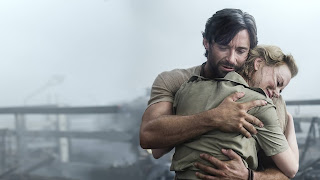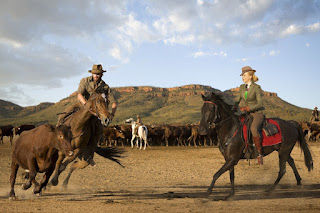In 1939, Lady Sarah Ashley (Nicole Kidman) travels from England to remote northern Australia to admonish her philandering husband. He is operating the fledgling Faraway Downs cattle ranch and locked in a land battle with evil cattle baron King Carney (Bryan Brown), who is seeking to monopolize beef supplies to the army as World War Two rumbles to life.
Upon arrival Sarah meets Drover (Hugh Jackman), an independent cattle driver, then discovers her husband murdered. She fires foreman Neil Fletcher (David Wenham), who is secretly working for Carney to undermine Faraway Downs. Also on the ranch is young mixed-race child Nullah (Brandon Walters), who is in danger of being forcibly scooped up by the government and placed in a religious school. Sarah bonds with Nullah, who has a strong spiritual relationship with his Aboriginal grandfather King George (David Gulpilil).
Sarah teams up with Drover to drive her cattle on a treacherous journey to Darwin, where she hopes to break Carney's monopoly. But Fletcher is determined to stop them, while punishing Japanese air raids bring the war to the country's doorstep.
An epic running for 2 hours and 45 minutes, Australia attempts to capture the identity of a nation. Directed, co-produced, and co-written by Baz Luhrmann, the film is infused with an independent, can-do attitude, a strong bond between people and nature, and no shortage of visual beauty within the vastness of a sparsely populated continent. Also prominent is a sneaky sense of humour, essential to survive the physical and emotional hardships of forging a nation with pure toil.
Luhrmann unapologetically embraces sentimental, romantic, overblown, and old-fashioned grandeur. He also freely borrows nation-defining themes from epics like Gone With The Wind (1939), Red River (1948), and especially Once Upon A Time In The West (1968). Notably, a woman is most influential in taming the land, Lady Ashley discovering her motherly instincts, refusing to yield to the will of a corrupt competitor, standing up to ill-conceived government policy (doubtless drafted by men), and never giving up on Nullah when all seems lost. She points the direction to a more virtuous future, and inspires good men like Drover to hustle the country along.The mixed identity of Nullah represents Australia's dual European and Aboriginal heritage. Both the child and his grandfather King George possess a mystical association with nature, contributing to several highlight scenes including a mammoth cliff-hanging (literally) stampede. Once Sarah connects with Nullah (through an overused reference to Over The Rainbow) and witnesses boorish officers causing him misery, she intrinsically understands the future has to celebrate, not conceal and suppress, the coming together of two cultures.
Nicole Kidman and Hugh Jackman create a likeable couple with no shortage of chemistry, both displaying necessary doses of frontier stubbornness and feistiness. Bryan Brown and David Wenham occupy the opposite corner with suitable malevolence. Young Brandon Walters is instantly amiable as a child caught between two civilizations.
The centrepiece epic cattle drive is both exhilarating and exhausting to watch, and finds a celebratory climax. Remarkably, a whole additional hour is to come, the relationship between Sarah and Drover facing a serious crisis and the country now firmly in the shadow of Japanese air force hostilities. It may not be short nor subtle, but Australia unabashedly celebrates ambition and audacity.
All Ace Black Movie Blog reviews are here.













No comments:
Post a Comment
We welcome reader comments about this post.